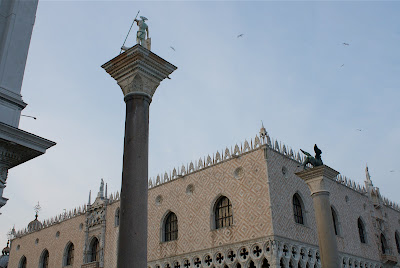 |
| The columns in the last light of this evening |
Yes, in the heart of a public square, in the midst of a today whose dominion is fractured on this spot, something of the twelfth century, of a twelfth century so long since fled, rises up in a double thrust of slender pink granite.
All around, the hum of the present moment, of the days we are living, crowds and circulates about the columns, but there it abruptly ceases, takes flight, like bees that have been driven off; for these tall, delicate enclaves of the past are not in the present, but in another time into which the present is forbidden to penetrate.
Around the pink columns, surging upwards towards their broad capitals, the present moment crowds and hums. But they interpose in the midst of it, pushing it aside, reserving the inviolable place of the past with all their slim thickness--of the past risen familiarly up in the midst of the present, with that rather unreal colouring of objects that a sort of illusion causes us to see a few paces away, but which are in reality situated many centuries away; their whole aspect addressing our minds rather too directly, exalting them somewhat as is scarcely surprising with a ghost returned from a buried age; yet there, in the midst of us, approached, brushed against, fingered, motionless, in the sunshine.
--This is the conclusion of the little-read essay On Reading by Marcel Proust, translated by John Sturrock.
All of the above forms a single paragraph in the original, but for ease of reading on a computer I've inserted a white space between each sentence.
The essay was originally written as a preface for a translation of John Ruskin's Sesame and Lilies, and the ideas Proust expresses in it about reading are, oddly enough, entirely opposed to those expressed by Ruskin in the translated work itself. (The only other time I've come across a similar disjunction of preface and work was in the liner notes to a CD of music composed, as it happened, by Proust's lover Reynaldo Hahn, which so denigrated the pieces as to make you feel foolish for even listening to them.)
In opposition to Ruskin's traditional idea of reading as a form of communication between reader and the most historically distant author, Proust insists on the reading experience as, ideally, the most personal and idiosyncratic of experiences, in which your memories of the surroundings in which you read a book are at least as important as what the book contained.
It's a great subversive essay--and a nightmare of educators everywhere.
No comments:
Post a Comment